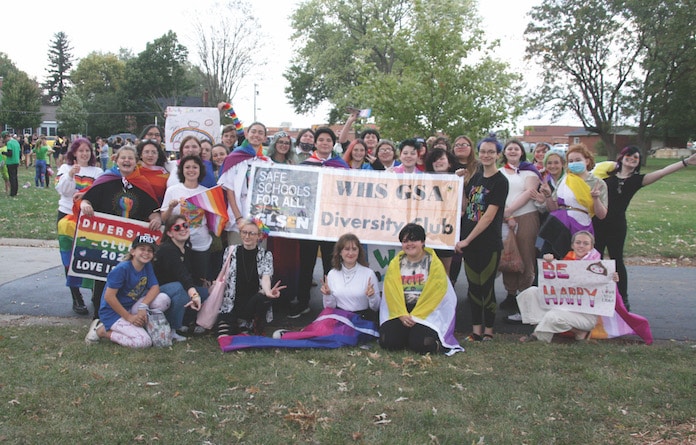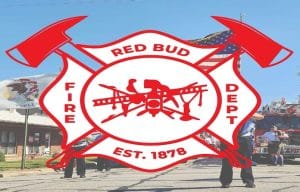Waterloo Diversity Club creates a safe space

With colorful flags and attire, the Waterloo High Diversity Club walked in the school’s Homecoming parade for the first time since its 2016 inception, and they were welcomed with candy donations and applause.
“It was really awesome (for the club) just to go out there for the first time publicly in the community,” club co-officer Nathan Dell, a junior at WHS, said. “We turned the first corner and it almost brought me to tears because of how much support that we got from just that first corner of people. It was amazing.”
While the group, which is WHS’s Gender and Sexualities Alliance Network group, has changed over the years. WHS English teacher and club adviser Maggie Partipilo said there has been one consistent theme: inclusivity.
“The year that it was proposed (at the school), GSA nationally stood for Gay and Straight Alliance. At the time, the kids who wanted to start it here felt that (the name) was not inclusive enough, they wanted to include everyone, and so they came up with the name Diversity Club,” Partipilo explained.
Later that year, the GSA Network changed its name to Gender and Sexualities Alliance Network to better reflect the vast range of different gender identities and sexual orientations of the youth it serves. These identities are often represented by the acronym LGBTQ, which stands for lesbian, gay, bisexual, transgender and queer/questioning.
It is important to note that while the word “queer” has been used as a slur in the past, it is now being reclaimed to be used as an umbrella term to describe individuals with gender identities, gender expressions and sexual orientations that do not fit dominant norms, as the Gay, Lesbian and Staight Education Network explains.
“It was really cool when they found out that GSA had changed what it stood for for the same reason that they changed it to Diversity Club,” Partipilo said.
As years went by, Diversity Club has expanded its reach to include other marginalized groups, such as racial and ethnic minorities.
“The kids also really want to include other groups that are marginalized in the world,” Partipilo said. “So when it’s Black History Month, they want to talk about Black history and when it’s Indigenous People’s Day, they want to talk about indigenous peoples It’s really cool how they recognize the fact the LGBTQ community is not the only marginalized community and that it’s just as important to understand and learn about all of the other communities.”
Club co-officer Bee Steed, a senior at WHS, said this is extremely important.
“I feel like a lot of people struggle,” Steed said. “There is a lot of hate in this school and I feel like everybody just needs a safe space to go to if needed.”
The group fosters this supportive environment by always being ready to lend support.
“We make sure that everybody has somebody to talk to,” Steed explained. “Me, Partipilo and Nathan always offer our ears to anybody that wants to speak to us if they’re having any issues.”
A large activity for the group is participating in the GLSEN Day of Silence, which the national organization provides supplies for.
“For Day of Silence we get T-shirts, buttons and little cards that say, ‘I’m staying silent today to represent the fact that LGBTQ kids are silenced sometimes in school,’” Partipilo explained. “They’re silenced by bullying and they’re silenced because they can’t find safe spaces. So the idea then is to spread awareness by not speaking all day.”
Because other students and staff are curious why the students aren’t speaking, the event is a unique way to raise awareness. A Night of Noise marks the end of the day where students can celebrate speaking out against discrimination and harassment.
The group also celebrates different LGBTQ calendar days. For example, during Ally Week, they put up signs across the school explaining why allyship is important and how one can be a good ally.
Dell and Steed explained the club is raising awareness of the importance of correct pronoun use.
“A big topic that we’ve talked about is the use of pronouns in our school’s system,” Dell said, explaining that students can easily enter preferred pronouns on their school IDs or in other simple ways. “On the first day of school, a teacher could ask for preferred name and pronouns because it doesn’t necessarily match with the school’s system and database.”
Recently, the WHS Diversity Club gave a presentation on this at a staff meeting.
This is not the only school-wide change the club is hoping to make.
“We have been working on trying to get menstrual products in men’s bathrooms for trans students, which is going rather smoothly,” Dell said.
Steed said the group is in the early stages of planning a gender affirming clothing initiative.
“We are thinking about trying to start like a little clothes (program) so that people who are trans or non-binary can be comfortable in their own clothes, so they can change before school and they can look how they want to at school whereas they can’t at home or getting (breast) binders for kids who can’t receive them at home,” Steed said.
The rapid increase in members has enabled the club to expand their initiatives. Steed said since three years ago, the club has doubled in size.
“It’s gotten a lot bigger and I feel like there are a lot more people open about it,” Steed said. “It’s a lot more positive environment.”
Steed and Dell said they attribute this to a more open attitude among younger students.
“There are a lot more people open about their gender and sexuality than some of the upperclassmen,” Steed said. “In my grade, there are not that many people who are either gay or trans … there is a good amount of the freshmen class who are very open.”
Dell believes representation of diverse individuals in the media can influence students to take pride in their identities.
“I think it’s empowering to most students when they see that there are people like them and they are doing big things in the world and they are putting themselves out there. It gives (students) inspiration to do the exact same thing,” Dell explained.
To support the WHS Diversity Club, members ask that donations be made to the Trevor Project, a nonprofit that aims to reduce suicide in LGBTQ youth. The club also encourages community members to fly Pride flags and other LGBTQ-friendly symbols to show support, educate themselves on LGBTQ issues and donate to other LGBTQ friendly clubs and organizations.
For those interested in keeping up with Diversity Club happenings, reach out to Partipilo at mpartipilo@wcusd5.net.






